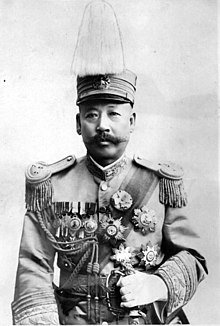Cao Kun
| Cao Kun | |
|---|---|
 |
|
| President of the Republic of China | |
|
In office 10 October 1923 – 30 October 1924 |
|
| Premier |
Gao Lingwei Sun Baoqi Ku Wei-chün |
| Preceded by | Li Yuanhong |
| Succeeded by | Duan Qirui |
| Personal details | |
| Born | 12 December 1862 |
| Died | 15 May 1938 (aged 75) |
| Political party | Zhili clique |
| Military service | |
| Allegiance |
|
| Battles/wars |
First Sino-Japanese War Beijing coup National Protection War Zhili–Anhui War First Zhili–Fengtian War |
| Cao Kun | |||||||||
| Traditional Chinese | 曹錕 | ||||||||
|---|---|---|---|---|---|---|---|---|---|
| Simplified Chinese | 曹锟 | ||||||||
|
|||||||||
| Transcriptions | |
|---|---|
| Standard Mandarin | |
| Hanyu Pinyin | Cáo Kūn |
| Wade–Giles | Ts'ao K'un |
Cao Kun (Chinese: 曹锟/曹錕; Courtesy name: Zhongshan (仲珊)) (December 12, 1862 – May 15, 1938) was a President of Republic China and military leader of the Zhili clique in the Beiyang Army; he also served as trustee of the Catholic University of Peking.
Cao was born in a poor family in Tianjin. During the First Sino-Japanese War in 1894, he went with the army to fight in Choson. After the war was over, he joined Yuan Shikai to participate in the training of New Army (Known as the Beiyang Army). Admired by Yuan, Cao managed to rise very quickly. At the time of 1911 Xinhai Revolution, he commanded the Beiyang 3rd Division.
He was made a general in the Beiyang Army and led the Zhili clique after the death of Feng Guozhang. During the 1918 election, he was promised the vice-presidency by Duan Qirui but the office remained vacant after most of the National Assembly left, depriving it of a quorum. He felt betrayed by Duan and defeated him in battle in 1920. He forced the resignations of both Xu Shichang and Li Yuanhong and was president of the Republic of China (in Beijing) from October 10, 1923 to November 2, 1924.
Cao had a family connection to the Chinese Muslim military commander Ma Fuxing, who resided in Xinjiang.
...
Wikipedia
